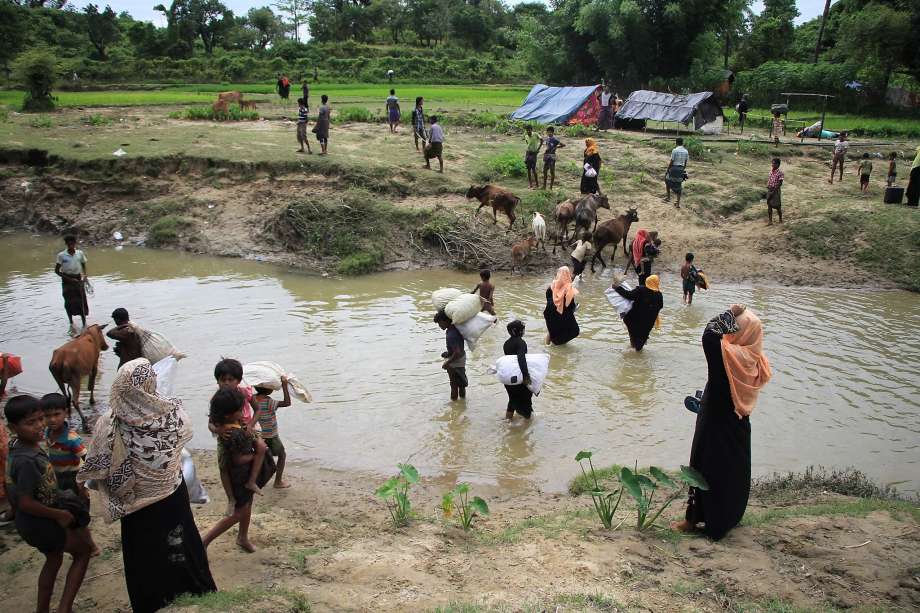United Nations High Commissioner for Human Rights Zeid Ra’ad al-Hussein condemned on Tuesday the violence that has erupted in Myanmar’s volatile Rakhine State, urging the authorities to uphold international law.
He warned all sides against fueling further violence, saying Myanmar authorities should issue clear instructions to security forces to refrain from using disproportionate force against Rohingya Muslims.
The state has a duty to protect “without discrimination,” he said about the security forces’ crackdown on Rohingya Muslims in Rakhine state that has forced thousands to flee to safety towards Bangladesh.
Dhaka on Monday however said that it will no longer take in any more refugees.
Zeid called on the Myanmar political leadership to “condemn the inflammatory rhetoric and incitement to hatred that is proliferating, including on social media”.
More than 8,700 Rohingya have fled from Myanmar into Bangladesh since the attacks, Zeid said in a statement.
“This turn of events is deplorable. It was predicted and could have been prevented.”
Meanwhile, at the Bangladesh border, border guards are trying to block the Rohingyas from crossing in, and aim to round up and send back those who do.
The fleeing Rohingya face a growing danger of sickness and attempts by the Bangladesh authorities to send them home despite a UN appeal that they be allowed to stay.
A series of coordinated attacks by Rohingya insurgents on Myanmar security forces on Friday, in the north of Rakhine state, has triggered a crackdown by Myanmar forces that has sent a stream of Rohingya villagers fleeing to Bangladesh.
It also sparked a mass evacuation of thousands of Buddhist residents of the area.
Zeid condemned the insurgent attack on Tuesday.
At least 109 people have been killed in the clashes in Myanmar, most of them militants, but including members of the security forces and civilians.
Bangladesh, which is already host to more than 400,000 Rohingya who have fled persecution in Buddhist-majority Myanmar since the early 1990s, has said it will not accept any more.
Border guard officials told Reuters they had sent back about 550 Rohingya since Monday, via the Naf river that separates the two countries, despite an appeal by UN Secretary General Antonio Guterres for Dhaka to allow Rohingya to seek safety.
An estimated 5,000 Rohingya have been able to cross into Bangladesh over the past few days, most slipping in at night over the land border near the Bangladeshi village of Gumdhum.
Many are sick and at least six have died after crossing in, an aid worker said, adding that fear of being caught and sent back meant some refused to seek help.
Thousands of Rohingya are stranded in the no man’s land between the two countries, trying to get into Bangladesh, aid workers and fellow Rohingya say.
The Rohingya are denied citizenship in Myanmar and classified as illegal immigrants, despite claiming roots there that go back centuries. They are marginalized and their communities occasionally subjected to communal violence.
A Rohingya insurgent group called the Arakan Rohingya Salvation Army, which Myanmar has declared a terrorist organization, claimed responsibility for the Friday attacks. It was also behind a similar though smaller series of attacks in October, which also triggered a tough Myanmar army response.
The treatment of about 1.1 million Muslim Rohingya in Myanmar has become the biggest challenge for national leader Aung San Suu Kyi, who has been accused by Western critics of not speaking out on behalf of the long-persecuted minority.
Rohingya leaders and intelligence officials said 8,000-9,000 Rohingya have entered Bangladesh since the violence broke out last Thursday.
Human rights groups and advocates for the Rohingya say the army retaliated by burning down villages and shooting civilians, forcing thousands to flee. The official death toll as of Sunday was 96 — most described by the government as “terrorists” — though the actual figure is likely to be higher.
Both the government, in official statements and its critics, in posts on social medias often accompanied by video clips, said there was widespread burning of buildings and even whole neighborhoods in Maungdaw township in northern Rakhine on Sunday.
